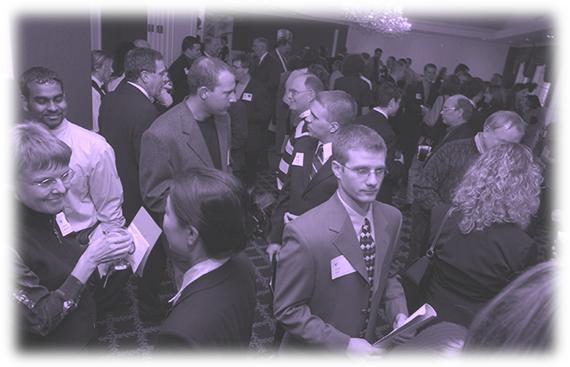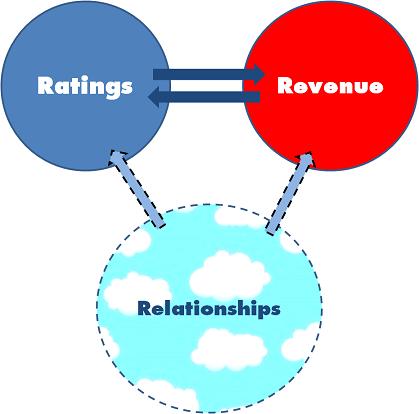I was being interviewed the other day about what else? Best practices in social media for radio.
 And the question revolved around an old theme – ROI. It seems that in these times of rapidly depleting resources – human and financial – the same questions continue to be asked about whether social media has definable, measurable value.
And the question revolved around an old theme – ROI. It seems that in these times of rapidly depleting resources – human and financial – the same questions continue to be asked about whether social media has definable, measurable value.
How do broadcasters at the local level or in the corporate corner office determine whether any “extra-curricular” activities have demonstrable worth – streaming, podcasts, social media, mobile apps, and the countless other “channels” that demand time, staffing, and attention?
On the social media front, the question becomes even murkier because broadcasters don’t even own these assets – their Facebook pages and their Twitter accounts. We’ve discussed the “rent/own” relationship in this space before. When you consider that radio only controls certain fixed assets – the on-air sound, websites, databases, podcasts, etc. – is expending time and effort on the social media stage worth it?
So here’s my response…
Let’s say that you were invited to a party where the guests promised to be some of the city’s biggest, most important advertisers and civic leaders. Would you go? Would you even go out of your way to make sure you had a great look and were prepared with ideas, questions, thoughts, and conversation-starters?
Keep in mind that the chance of writing any business at the party is probably non-existent. This is simply a social gathering where you have a chance to chat with some of the biggest players in town.
Of course, you’d go. Because the opportunity to introduce yourself and strike up relationships and network with these people is so powerful that you’d definitely invest the time. Essentially, what’s the ROI on this gathering?
 Would it be any different if I told you that the party guests would be mostly comprised of some of your biggest and most loyal listeners? These are some of your core followers who simply like your station, many of whom are connected to their own fan and friend networks of significant size. So, if they get to know you better and like you even more, they’re very likely to tell many others.
Would it be any different if I told you that the party guests would be mostly comprised of some of your biggest and most loyal listeners? These are some of your core followers who simply like your station, many of whom are connected to their own fan and friend networks of significant size. So, if they get to know you better and like you even more, they’re very likely to tell many others.
And I’d bet that if you came armed with some entertaining ideas, questions, facts, or even pictures, you’d share them with this group – and then maybe stay around to talk and even laugh about their reactions to your content. You could be the life of your own party.
So if it’s that easy to hang out, converse, and engage at a social gathering – and some of us do this much better than others – why then is this practice of doing it digitally often debated in broadcast circles? Why do radio people argue about the need to acknowledge important, supportive, and nice “party guests?”
Why do some seldom show up, or spend more time talking about themselves than engaging with others? We all know what happens when a party guest is a boor, is self-centered, or simply ignores everyone in the room. Over time, he’s “uninvited” from future parties because he just doesn’t get it.
Thus, social media. And the station-level discussions that we have tend to revolve around priorities. At our client digital strategy sessions, where Lori Lewis and I walk into station conference rooms packed with key staffers, we frequently spend time discussing digital goals. Too often, station staffers – and their parent companies – struggle with the real purpose of why they’re engaged in digital and/or social in the first place.
Maybe it would be helpful to think about success through a different lens – as a new version of the Three R’s. In this case, ratings, revenue, and relationships.
Stations need to decide which of these is truly desirable as a byproduct of their social efforts because it may be possible to attain a percentage of all three – maybe just not at the same time. Lori might argue that without relationships, the ability to attain higher ratings and increased revenue is stunted. Too often, station managers are at odds with each another but what’s most important socially for their brands.
But the fact is, you could dedicate your social efforts to making money (deals, web traffic, and “pinballing” listeners to your contests or sales promotions), and it might work. In the process, however, you might miss something very important – the essence of why social media exists in the first place.
Or you could simply use social to drive ratings. Keep promoting your contests, giveaways, and morning show guests – at specific times – and hope that your Facebook and Twitter communities take you up on these appointments, offers, and promotions.
Or you could focus on creating stronger bonds with your most important and engaged listeners via social relationships. But what good does that actually do you?
So, what’s the goal? Is it ratings, revenue, or relationships?
Clearly, ratings lead to revenue (at least a lot of the time). And you can see that depicted in the diagram below. And sometimes the reverse is true, if in fact, revenue/profits are plowed back into supporting the station’s content, marketing, or research – rather than just being thrown to the bottom line.
But then there are relationships. And while ratings and revenue don’t really improve relationships, the opposite often works, albeit indirectly (hence the clouds). That’s also why the arrows leading from relationships to revenue are hashed. None of us knows precisely how engagement and trust translate into higher ratings and more sales – but we know that in our life dealings, this is often the way it works. Yes, it’s a leap of faith in a metric-driven, ROI environment. But we know it when we see it.
You become friendly with a car dealership and you want to buy your cars from your go-to salesperson who has helped you through a few jams, gnarly financing, or getting you the features you value. A local restaurant treats you well, knows you by name, and always seems to have a table for you. Your doctor always takes the time to listen to you, and squeezes you in when you have a medical issue, and so you recommend her to others.
The list goes on, but we all have those relationships that keep bringing us back, even though temptations abound from other deals, discounts, and pressures. When there’s trust, good things happen.
For the first time since you established your database, social media affords you the ability to connect with fans – and not just at street events or on the request line – but thousands of them in a direct, digital way. And many are just the type who enjoy sharing your stories with others in their fans/friends/followers networks.
If your database is essentially a house of cards – built on contests and come-ons – your social media channels provide you with a second chance to create an environment where you have the opportunity to finally create bonds that truly matter.
Fostering relationships isn’t easy. You can’t just throw up a bunch of boards, test the music, or come up with a first quarter sales trip. None of that builds trust.
It takes work, focus, dedication, and a deft touch – resources and skills that are not typically in abundance at many stations. The good news is that small stations, independent owners, and agile teams may actually have an advantage in building and maintaining relationships.
If you need help in this area, by all means get it, but this is a wonderful time to focus on that all important “3rd R” – especially before the competition does.
There is ROI on relationships.
- Media And Technology In 2025: Believe It Or Not! - April 18, 2025
- In Radio, You Just Never Know - April 17, 2025
- The Secret To Making A Great Podcast (And Great Radio) - April 16, 2025





Great thoughts, Fred. Relationships. Duh. Seems so simple, yet I think we forget sometimes. Relationships are how you matter to people (at home, in life, and in business.) We need to make our stations matter to people and buliding relationships is the way.
Thanks for the kind comments, Ken. At both WROR and Radio 92/9, you’re getting that message from two very distinct demos – and yet the commonalities are there. Yes, it starts with relationships. From there, everything else falls into place.
Fred, The folks at Pew Research have come up with a very strong reason – that you alluded to – you having a strong social media strategy. Multiplication. Getting your customers (or listeners) to actively respond to your content gains you access to a wider network than you can gain on your own. It amazes me that with so few marketing dollars to spend that radio isn’t using social media to its fullest.
https://wp.me/p10rKc-iZ
Steve Allan
Steve, couldn’t agree more. I was speaking to a group of high school radio students last night, and started to think back about my early years with WRIF. We created 2-3 TV campaigns a year, billboards, and we had seemgingly unlimited funds to market and promote the station. You look at stations today, and some of the best brands are the ones that are deprived because broadcasters tend to focus on the stations that are hurting and need help. It’s counter-intuitive, to be sure. And that’s why your point is so salient – why wouldn’t some of radio’s better brands utilize social media more effectively for bonding and outreach? Not “getting” it is no longer an excuse. Thanks for taking the time.